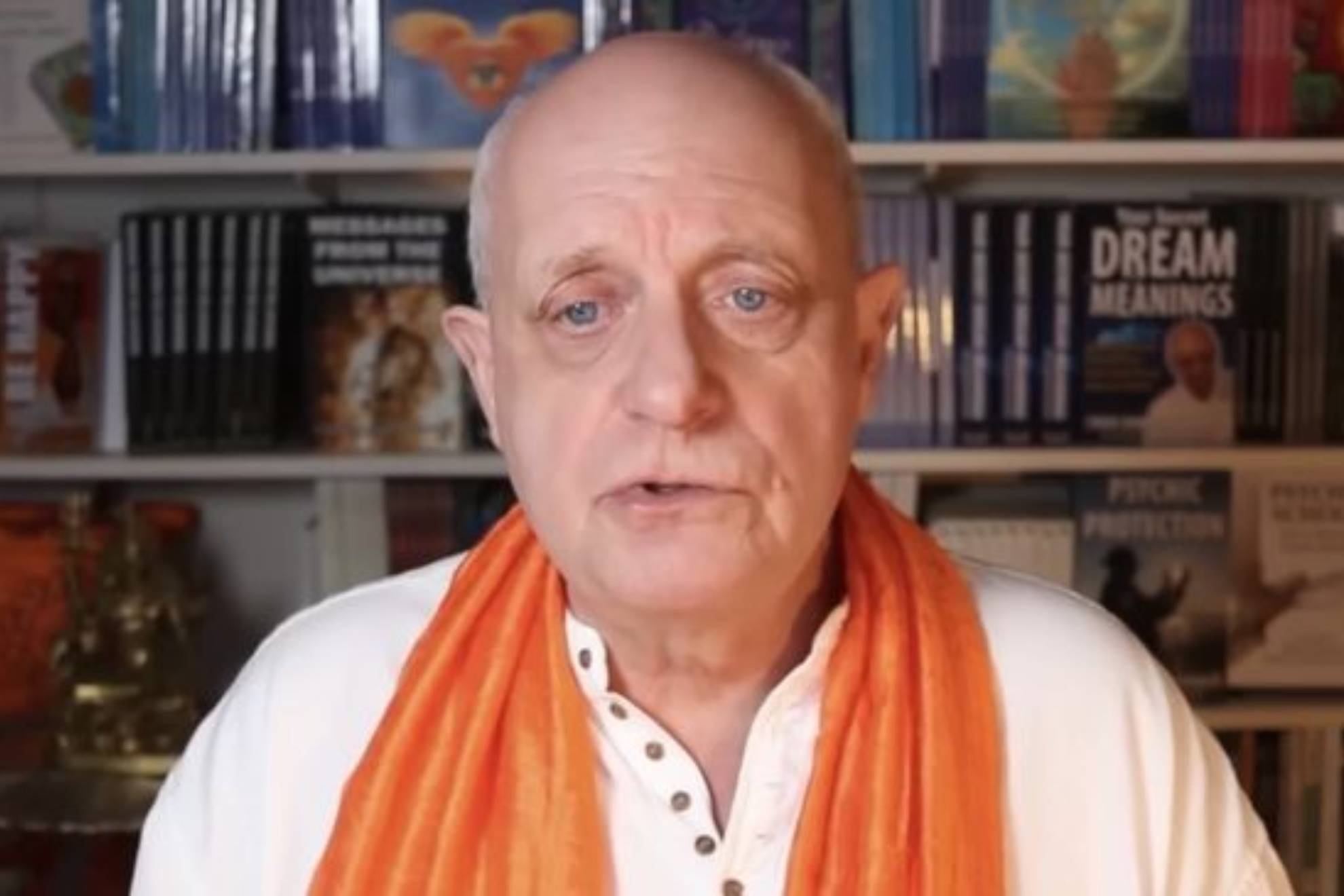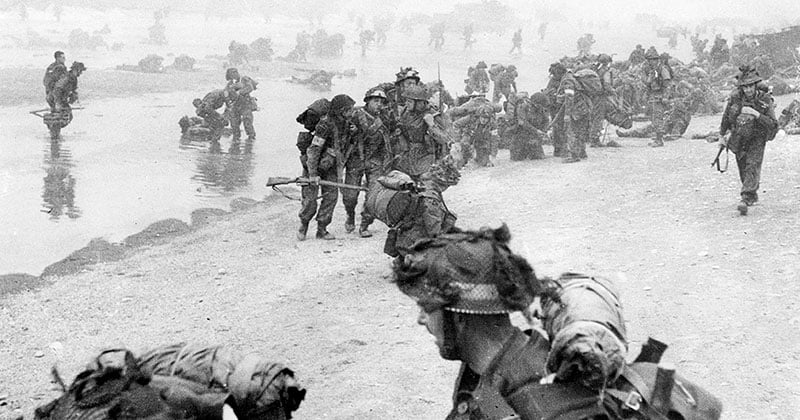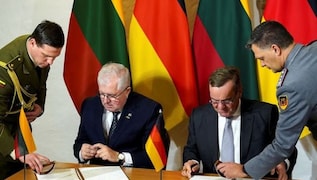This decade kicked off with unexpected twists: the COVID-19 crisis, the Ukraine war’s onset, and according to Craig Hamilton-Parker or the “New Nostradamus”, the start of World War III is on the horizon. He insists that this looming conflict is closer than most believe.
The ‘New Nostradamus,’ recently warned on his YouTube channel about an upcoming military event not witnessed since the end of World War II in 1945, when the Second World War ended with the surrender of Nazi Germany.

Now let’s draw parallels. During World War II, Hitler employed a strategy known as the “Festung Europa” or Fortress Europe. He stationed a significant portion of German troops along the Western European coastline, heavily fortifying key positions and constructing defensive structures to repel any potential Allied invasion.
Join us on Telegram: https://t.me/tfiglobal
However, this strategy yielded unintended outcomes. By concentrating troops along the coastlines, Germany inadvertently exposed the comparatively vulnerable Eastern Front. Consequently, the Soviet Union’s massive counter-offensive in 1943 caused the collapse of Germany’s Eastern Front, compelling Hitler to divert troops from Western defenses to reinforce this weakened front. This shift in strategy weakened the Western defenses, rendering them ill-prepared for the eventual Allied invasion.
Additionally, the Allies executed Operation Fortitude, a strategic deception plan, misleading the Germans into anticipating an invasion at Pas-de-Calais rather than Normandy. This diversion further tied up German resources in the wrong area, hindering their swift response during the Normandy landings, or D-Day, on June 6, 1944. Hitler’s fixation on coastal defense proved counterproductive, leaving Western Europe vulnerable and contributing to the Allies’ successful invasion and ultimately, the downfall of Nazi Germany.

Read More: Germany runs out of funds to revamp its military
Back then, Germany deployed troops across three strategic fronts:
– Army Group North aimed for Leningrad
– Army Group Centre targeted Smolensk
– Army Group South focused on Kiev
And now, history seems to repeat itself. For the first time since World War II, Germany prepares to permanently station troops, this time in Lithuania.
A recent pact between Germany and Lithuania signifies the first permanent deployment of German troops abroad since World War II. This announcement emerged during Defense Minister Arvydas Anusauskas’s meeting with his German counterpart, Boris Pistorius, unveiling a multiyear “Roadmap Action Plan.” Approximately 4,800 German soldiers will be stationed long-term, a move deemed historic not only for both nations but also for NATO.

Starting in 2024, German troops, including those with families, will reside in Kaunas and Vilnius in Lithuania. Most troops are set to arrive between 2025 and 2026, with full operational capability anticipated by 2027. In exchange, Lithuania commits to providing the necessary civilian and military infrastructure. Although the agreement was initially announced in June, a specific timeline was not disclosed at that time.
“The German commitment of permanently stationing a brigade in Lithuania is a historical step for both Germany and Lithuania,” Anusauskas said Monday, according to a press release. “We are turning over to a page of even deeper strategic partnership.”
He went on: “The German Brigade will significantly increase our defensive potential and enhance NATO deterrence and collective defense. The Roadmap signed today lays out in detail the track we and Germany will take to implement it.”
Pistorius said the move was a positive step in defense relations, considering the lengthy war between Ukraine and Russia, the latter of which borders Lithuania. Belarus, a close ally of Russia, also borders Lithuania.
“Germany understands clearly the new state of affairs in security politics: we are taking the role of leadership and responsibility in the [NATO] Alliance as we deploy a combat brigade in Lithuania,” Pistorius said in the release. “We will ensure reliable deterrence and we will be ready to [defend] NATO. We are sending a clear signal with this step to those who present a threat to peace and security in Europe.”
The strategy was devised by experts from both defense ministries. Most of the German troops will be situated within the Rūdninkai military training ground, while the remainder will be stationed in Rukla, joining the existing 1,000 allied troops already present there.

Lithuania’s Enhanced Forward Presence Battalion Battle Group will transition into a multinational battalion, integrating fully within the brigade, as stated in the release.
Lithuanian lawmaker Laurynas Kasciunas, leading the parliamentary National Security and Defense Committee, outlined the country’s commitment to allocate 0.3 percent of its gross domestic product in the coming years to support the deployment of German troops.
Pistorius drew parallels between this agreement and the Cold War era’s stationing of allied forces in West Germany, aiming to safeguard Western Europe in case of a Soviet threat, as reported by Reuters. Anusauskas emphasized that Russia’s aggression in Ukraine significantly influenced the initiation of this new plan.
“We should expect not only good scenarios but also the very worst scenarios,” he said. “So we must be ready…. Russia remains the main threat to us and NATO.”
So, Germany’s gearing up to tackle the rising Russian threat in the region. But can they pull it off? If the country’s own politicians are to be believed, Germany might not even last two days in a war.
We at TFIGlobal have already delved into the Bundeswehr’s struggles, Germany’s Armed Forces facing major challenges due to supplying material and ammo to Kiev. Johann Wadephul, from the Christian Democratic Union, dropped a bombshell, stating, “Crucial German troop units can barely hold out for two days in battle due to these shortages.” He’s alarmed, saying, “It’s a catastrophic situation overall. Anyone talking about readiness for war should’ve made sure the Bundeswehr could at least defend itself. Sadly, it’s quite the opposite.”
Read More: Ukraine’s Aftermath: Germany cannot survive for more than 2 days in a War
Wadephul slammed the slow progress in bolstering the nation’s military preparedness, pinning the blame on German Defense Minister Boris Pistorius for the existing predicament. He decries the abundance of grand speeches without tangible efforts to fix the current situation.
In the wake of Ukraine’s conflict, it’s been exposed that Germany might not hold out for more than two days in battle, as revealed by the country’s own politicians. So, Germany’s decision to deploy troops on the Lithuanian front seems rash. If another world war erupts, history might repeat itself with Germany facing a fate akin to its surrender in the past.
Recommended Video:








